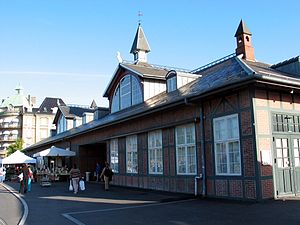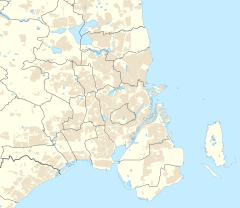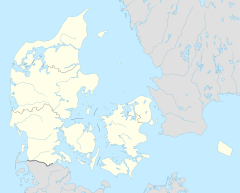Østerport railway station
This article needs additional citations for verification. (July 2023) |
| Metro, S-train and main line station | |||||||
 Østerport station in 2005 | |||||||
| General information | |||||||
| Location | Oslo Plads 8 2100 Copenhagen Ø[1] Copenhagen Municipality Denmark | ||||||
| Coordinates | 55°41′32″N 12°35′15″E / 55.69222°N 12.58750°E | ||||||
| Elevation | 6.8 metres (22 ft)[2] | ||||||
| Owned by | DSB | ||||||
| Line(s) | |||||||
| Platforms | 6 island platforms (1 for Metro, 2 for S-train, 3 for Kystbanen) | ||||||
| Tracks | 9 in service (incl Metro) + 1 siding | ||||||
| Bus routes | |||||||
| Construction | |||||||
| Structure type | Above ground (Regional, S-train) Underground (Metro) | ||||||
| Platform levels | 2 | ||||||
| Other information | |||||||
| Station code | Kk | ||||||
| Fare zone | 1 | ||||||
| History | |||||||
| Opened | 2 August 1897 | ||||||
| Rebuilt | 15 May 1934 (S-train) | ||||||
| Electrified | 1934 (S-train), 1986 (Mainline) | ||||||
| |||||||
Østerport station is a metro, S-train and main line railway station in Copenhagen, Denmark.[1][3] It is located between the districts of Indre By and Østerbro, and is named for the historic Østerport city gate, near the original location of which it is located.
The station is served by some InterCity services across Denmark, regular and frequent regional train services to and from Zealand and southern Sweden, as well as commuter rail services on the S-train network. As of 29 September 2019, Østerport is also served by the Copenhagen Metro City Circle Line and M4.
The station is used by approximately 30,000 passengers each day.
History
[edit]
The station opened in 1897 as the southern terminus of the Coast Line from Copenhagen to Helsingør. It was originally named the East Station (Østbanegaarden).
It was originally the terminus for the Coast Line, but when the station was connected with Nørreport Station and Copenhagen Central Station via the Boulevard Line in 1917, the terminus moved to the Central Station. In 1934, the station started serving S-trains.
Architecture
[edit]
The station was designed by Danish architect Heinrich Wenck, who was head architect of the Danish State Railways from 1894 to 1921. The station is designed in National Romantic style, a Nordic architectural style that was part of the National Romantic movement during the late 19th and early 20th centuries, and which is often considered to be a form of Art Nouveau.
Although originally intended as a temporary solution, the original station building has survived to the present day. It was restored in the 1980s and again in the 2010s.
Services
[edit]
The station is served by some InterCity services across Denmark, regular and frequent regional train services to and from Zealand and southern Sweden, as well as commuter rail services on the S-train network. By 2019, the service was included the Copenhagen Metro as well (future line M4).
Metro station
[edit]
The Copenhagen Metro line M3 (opened 2019) on the City Circle Line serves another station called Østerport. The metro station is located under the street Østbanegade with the staircase towards Østerport station. Another line M4 later supplement line M3, going to Nordhavn and Ny Ellebjerg. A subway between the metro platforms to Østerport station is in operating.[citation needed]
Service
[edit]| Preceding station | Following station | |||
|---|---|---|---|---|
| Terminus | Copenhagen–Esbjerg | Nørreport towards Esbjerg
| ||
| Copenhagen–Malmö | Nørreport towards Malmö C and beyond
| |||
| Hellerup towards Helsingør
|
Elsinore–Copenhagen–Køge–Næstved | Nørreport towards Næstved
| ||
| Elsinore–Copenhagen–Roskilde–Næstved | ||||
| Terminus | Copenhagen–Slagelse | Nørreport towards Slagelse
| ||
| Copenhagen–Nykøbing F | Nørreport towards Nykøbing F
| |||
| Copenhagen–Kalundborg | Nørreport towards Kalundborg
| |||
| Copenhagen–Holbæk | Nørreport towards Holbæk
| |||
| Preceding station | Following station | |||
| Nørreport towards Ballerup
|
H Mon–Fri
|
Terminus | ||
| Nørreport towards Frederikssund
|
C | Nordhavn towards Klampenborg
| ||
| Nørreport towards Høje Taastrup
|
Bx Peak hours
|
Nordhavn towards Buddinge
| ||
| B | Nordhavn towards Farum
| |||
| Nørreport towards Solrød Strand
|
A | Nordhavn towards Hillerød
| ||
| Nørreport towards Køge
|
E Mon–Fri
|
Nordhavn towards Holte
| ||
| Preceding station | Following station | |||
| Marmorkirken clockwise
|
M3 | Trianglen counter-clockwise
| ||
| Marmorkirken towards Copenhagen South
|
M4 | Nordhavn towards Orientkaj
| ||
Ridership
[edit]According to the Østtællingen in 2008:[4]
| Year | Total | Year | Total | Year | Total | Year | Total |
|---|---|---|---|---|---|---|---|
| 1957 | 10,566 | 1974 | 9,627 | 1991 | 11,482 | 2001 | 10,484 |
| 1960 | 10,300 | 1975 | 9,556 | 1992 | 11,872 | 2002 | 10,484 |
| 1962 | 10,011 | 1977 | 9,012 | 1993 | 11,565 | 2003 | 10,991 |
| 1964 | 10,758 | 1979 | 12,220 | 1995 | 11,269 | 2004 | 10,346 |
| 1966 | 10,421 | 1981 | 13,263 | 1996 | 11,600 | 2005 | 9,504 |
| 1968 | 10,416 | 1984 | 13,386 | 1997 | 12,202 | 2006 | 9,779 |
| 1970 | 10,347 | 1987 | 12,407 | 1998 | 14,327 | 2007 | 10,598 |
| 1972 | 10,855 | 1990 | 11,563 | 2000 | 12,236 | 2008 | 9,518 |
In popular culture
[edit]Østerport station is seen at 1:24:15 (track 13) and again at 1:24:48 /track 5/) in the 1975 Olsen Gang film The Olsen Gang on the Track.[5]
See also
[edit]- Transportation in Denmark
- Transportation in Copenhagen
- Rail transport in Denmark
- History of rail transport in Denmark
- List of railway stations in Denmark
- Danish State Railways
- Banedanmark
References
[edit]- ^ a b "Østerport Station" (in Danish). DSB. Retrieved 6 May 2024.
- ^ "Østerport Station (Kk)". danskejernbaner.dk (in Danish). Retrieved 13 December 2024.
- ^ "Østerport metrostation" (in Danish). Copenhagen Metro. Retrieved 6 May 2024.
- ^ "Østtælling 2008 DSB og DSB S-tog". 13 November 2008. p. 17. Archived from the original on 18 May 2023.
- ^ "Film 7 Olsen banden på sporet / Die Olsenbande stellt die Weichen". olsenbande-homepage.de (in German). Retrieved 5 October 2017.
External links
[edit]- Art Nouveau architecture in Copenhagen
- Art Nouveau railway stations
- City Circle Line (Copenhagen Metro) stations
- Coast Line (Denmark)
- Heinrich Wenck railway stations
- Listed buildings and structures in Østerbro
- Listed railway stations in Copenhagen
- M4 (Copenhagen Metro) stations
- National Romantic architecture in Copenhagen
- Railway stations in Copenhagen
- Railway stations in Denmark opened in 1897
- S-train (Copenhagen) stations
- Timber framed buildings in Copenhagen






